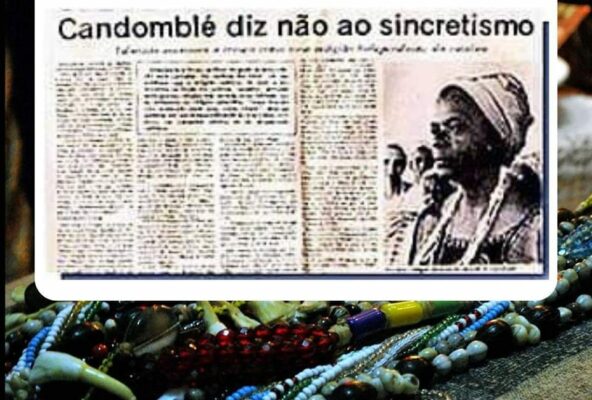-
Candomble say no to syncretism
In the year 1983, Iyalorixás assumed the belief (Candomblé) as a religion independent of the Catholic one.
“From now on, the children of people from Santo will no longer learn their tradition of the Orixás in syncretism with the Catholic religion. The iyas and babalorixás of Bahia also no longer want to allow their religion to be treated as folklore, sect, animism or primitive religion, ‘as has always been the case in this country, in this city’. They also want to put an end to the use of their costumes, and rituals, in official contests or tourist propaganda” – Jornal da Bahia Salvador, August 12, 1983
“Mother Stella actively participated in the recent World Conference on the Tradition of the Orixás. She has no doubt that this attitude will resonate with the population. About what will the Catholic Church say? She replies: ‘The Pai de Santo who is consistent with his principles will no longer syncretize, but will pass on our knowledge to his children. As for what the Church, worship, thought can say is free’.” – Jornal da Bahia Salvador, August 12, 1983
“We need to be respected as a religion and not as the press does, for example, here in Salvador, which includes our houses of worship in folklore columns. – We are past the time of having to hide our religion. Our ancestors, in order not to be massacred, were led to syncretism. This is what we want to stop doing.”
Mother Stella de Oxossi – Jornal da Bahia Salvador, August 12, 1983
To the public and people of Candomblé
“…The Iyas and Babalorixás of Bahia, consistent with the positions taken at the II World Conference on the Tradition of the Orixás and Culture, held during the period from July 17 to 23, 1983, in this city, make public that after that it became clear our belief being a religion and not a syncretized sect…
… We cannot think, nor let others think of us as folklore, animism, primitive religion as has always been happening in this country, in this city, whether by opponents, detractors: graffitied walls, written articles – “Candomblé is a thing of the Devil ”, “Primitive or syncretic African practices”, either by the ritual costumes used in official contests and liturgical symbols consumed in the making of tourist advertising and even our houses of worship, our temples, included, indicated, in the folklore column of Bahian newspapers.. .
… we make public our position regarding the fact that our religion is not a sect, a primitive animist practice, consequently we reject syncretism as a result of our religion since it was created by the slavery to which our ancestors were subjected. We also talk about the great massacre, the consumption that our religion has suffered […] Those of sensationalism by the press, where only the aspects of syncretism and its tourist implications (washing in Bonfim, etc.) submission, ignorance, fear and even the “slave attitude” on the part of some followers, even Iyalorixás, representatives of “afro” associations, seeking to be accepted by political and religious authorities. Candomblé is not a matter of opinion […] We see that all the inconsistencies that have arisen among Candomblé people who want to go to the Bonfim washing machine carrying their little quarts, who want to continue worshiping Oyá and Sta. Bárbara, like two aspects of the same coin, are residues, marks of the economic, cultural and social slavery that our people still suffer. Since slavery, black has been synonymous with poor, ignorant, with no right to anything other than knowing that he has no right; he is a big toy within the culture that stigmatizes him, his religion also becomes a joke. Let’s be free, let’s fight against what kills us and disregards us, against what only accepts us if we are wearing the clothes we were given to wear. During slavery, syncretism was necessary for our survival, now in its consequences and public manifestations: people of saints, Iyalorixás, carrying out washing in churches, leaving the chambers for masses, etc., mischaracterizes us as a religion, giving rise to its use as something exotic, folklore, tourism. May our grandchildren be proud of belonging to the religion of their ancestors, that being black, black, will bring them back to Africa and not slavery. We hope that all the people of Candomblé, that the small houses, the big houses, the medium ones, the old and already folkloric characters, those considered Iyalorixás, said worthy representatives of what they propose, before anything else consider what they are talking about, what they are doing, regardless of the result they hope to obtain […]. Better the little we have than much borrowed. We also make it clear that our religious thought cannot be expressed through the Federation of Afro Cults or other similar entities, nor by politicians, Ogãs, Obás or any other people who are not the signatories of this. All this effort of ours is for wanting to return to the cult of the Orixás, to the African religion, the dignity lost during slavery and processes resulting from it: cultural, social and economic alienation that gave rise to folklore, consumption and profanation of our religion.
Signed:
– Little girl from Gantois – Iyalorixá do Axé Ilé Iya Omin Iyamassé
– Stella de Oxossi – Iyalorixá do Ilé Axé Opô Afonjá
– Tete de Yansã – Iyalorixá of Ilé Nasso Oke
– Olga de Alaketo – Iyaloriá of Ilé Maroia Lage
– Nicinha do Bogum – Iyalorixá do Zogodô Bogum Malê Ki-Rundo”
Source: Jornal da Bahia Salvador, August 12, 1983


